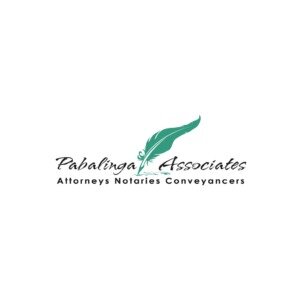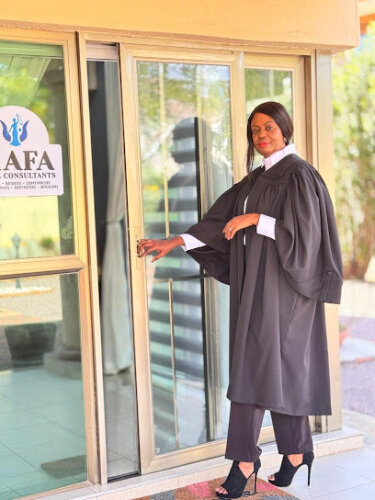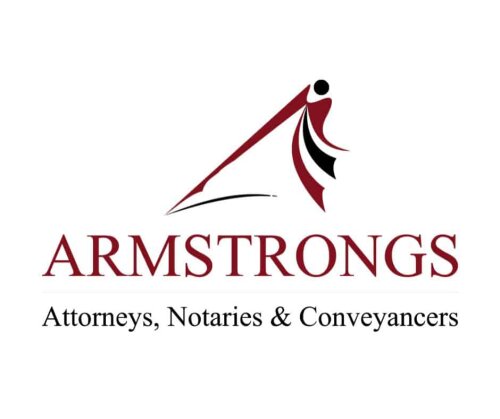Best Public-Private Partnerships (PPP) Lawyers in Botswana
Share your needs with us, get contacted by law firms.
Free. Takes 2 min.
Or refine your search by selecting a city:
List of the best lawyers in Botswana
About Public-Private Partnerships (PPP) Law in Botswana
Public-Private Partnerships (PPP) in Botswana involve collaborations between government entities and private sector partners to deliver public infrastructure and services. PPPs are used to leverage private sector investment, skills, and efficiency for public benefit. In Botswana, these partnerships typically focus on projects like transport infrastructure, healthcare facilities, water and sanitation systems, and energy developments. The PPP framework in Botswana is designed to ensure transparency, accountability, and value for money in delivering vital public projects while encouraging private sector participation and innovation.
Why You May Need a Lawyer
Engaging in Public-Private Partnership projects can be complex due to the involvement of multiple stakeholders and strict regulatory requirements. You may need legal assistance for the following reasons:
- Understanding the legal framework surrounding PPP projects in Botswana
- Drafting, reviewing, or negotiating PPP contracts and agreements
- Ensuring compliance with regulatory and procurement requirements
- Risk identification and allocation between parties
- Dispute resolution if conflicts arise during or after project implementation
- Securing financing and understanding the legal implications of funding arrangements
- Protecting intellectual property rights and confidential information
- Advising on tax, land use, environmental, and social issues connected to PPP projects
- Guidance for foreign investors regarding local requirements and processes
Local Laws Overview
Botswana has developed a legal and regulatory structure to support PPP projects and encourage effective collaboration between public and private sectors. The key aspects include:
- PPP Policy and Framework: Botswana follows a national Public-Private Partnerships Policy that sets out the principles and structures for PPP development and implementation. This provides guidance on procurement, project identification, vetting, and management processes.
- PPP Unit: The Ministry of Finance houses the PPP Unit, responsible for coordinating, approving, and monitoring PPP projects in the country.
- Procurement Regulations: All PPP projects are subject to public procurement laws to guarantee openness and fair competition. These processes are governed by the Public Procurement Act and related regulations.
- Standardized Agreements: Model contracts and templates are encouraged to promote consistency and clarity in PPP arrangements.
- Risk and Benefit Sharing: Laws and policies emphasize balanced risk allocation, ensuring that risks are assigned to the party best able to manage them.
- Dispute Resolution: Provisions are made for arbitration and legal recourse in case of disagreements or contractual breaches.
- Approval and Oversight: Larger or high-importance PPP projects require approval from relevant ministries and sometimes the cabinet, to safeguard public interest.
Frequently Asked Questions
What is a Public-Private Partnership (PPP) in Botswana?
A PPP in Botswana is a cooperative arrangement between a government agency and a private sector entity to deliver public services or infrastructure through shared investments, risks, and rewards.
Which government body oversees PPP projects in Botswana?
The PPP Unit within the Ministry of Finance is the central coordinating body for PPP projects in Botswana. It oversees project screening, procurement, and ongoing management.
What types of projects qualify as PPPs in Botswana?
Typical PPP projects include large-scale public infrastructure such as roads, bridges, hospitals, water systems, energy plants, and schools.
How are PPP projects procured in Botswana?
PPP projects are subject to Botswana's public procurement laws, with competitive bidding processes, transparency, and evaluation criteria established by the relevant legislation and guidelines.
Can foreign investors or companies participate in PPPs?
Yes, foreign investors are eligible to participate in PPP projects. They must comply with local laws regarding registration, taxation, and sector-specific regulations.
Are standard form agreements used in PPPs?
The government encourages the use of model or standard form agreements to ensure clarity and consistency across different projects, though contracts may be tailored for specific project needs.
How are disputes resolved in PPP contracts?
PPP contracts typically include clauses providing for arbitration and legal recourse, enabling parties to resolve disputes outside of or alongside traditional court proceedings.
What are the key risks in PPP projects?
Major risks include financial, operational, legal, and political risks, as well as risks related to construction delays, regulatory changes, and unforeseen events. These are identified and allocated in the contract.
Does the private sector have financial obligations in a PPP?
Yes, the private partner usually invests its own funds, which it recovers through user fees, government payments, or a combination of both, as outlined in the PPP agreement.
Where can I get advice about a specific PPP opportunity?
Legal advice can be sought from lawyers with experience in infrastructure and PPP matters. Additional advisory resources are available through the PPP Unit and regulatory agencies in Botswana.
Additional Resources
For those seeking more information or assistance with PPPs in Botswana, these resources may be helpful:
- Ministry of Finance PPP Unit: The central body for PPP project support, policies, and regulatory guidance.
- Public Procurement Regulatory Authority: Oversees procurement processes and ensures compliance with laws and standards.
- Botswana Investment and Trade Centre (BITC): Offers guidance for foreign and local investors regarding project opportunities and regulatory requirements.
- Botswana Law Society: Provides directories of legal professionals qualified to advise on PPP and infrastructure projects.
- Botswana Chamber of Commerce and Industry: Business advocacy group offering networking opportunities and information on PPP projects.
Next Steps
If you are considering engaging in a PPP project or need legal help related to such partnerships in Botswana, consider the following steps:
- Identify experienced legal practitioners in PPP and infrastructure law.
- Arrange an initial consultation to discuss the specifics of your project or legal challenge.
- Collect all relevant documents, contracts, and correspondence related to the project for review.
- Clarify your objectives and any areas of concern before seeking legal advice.
- Engage with relevant government departments or the PPP Unit if you require procedural or regulatory information.
- Explore online resources and publications provided by recognized organizations in Botswana for additional background knowledge.
- Stay updated on policy and legal developments affecting PPPs to ensure ongoing compliance during the project lifecycle.
Legal guidance is vital in navigating Botswana's PPP landscape, so working with a qualified lawyer will improve your project's success and ensure compliance with all legal requirements.
Lawzana helps you find the best lawyers and law firms in Botswana through a curated and pre-screened list of qualified legal professionals. Our platform offers rankings and detailed profiles of attorneys and law firms, allowing you to compare based on practice areas, including Public-Private Partnerships (PPP), experience, and client feedback.
Each profile includes a description of the firm's areas of practice, client reviews, team members and partners, year of establishment, spoken languages, office locations, contact information, social media presence, and any published articles or resources. Most firms on our platform speak English and are experienced in both local and international legal matters.
Get a quote from top-rated law firms in Botswana — quickly, securely, and without unnecessary hassle.
Disclaimer:
The information provided on this page is for general informational purposes only and does not constitute legal advice. While we strive to ensure the accuracy and relevance of the content, legal information may change over time, and interpretations of the law can vary. You should always consult with a qualified legal professional for advice specific to your situation.
We disclaim all liability for actions taken or not taken based on the content of this page. If you believe any information is incorrect or outdated, please contact us, and we will review and update it where appropriate.
Browse public-private partnerships (ppp) law firms by city in Botswana
Refine your search by selecting a city.
















